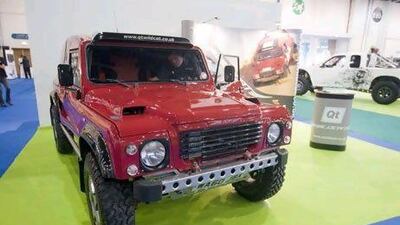Forget tailor-made suits. Why not pick up a tailor-made car or a trendy dune buggy?
Affluent motorists in the Gulf are now going to extraordinary lengths to customise their vehicles - and boutique car makers aim to cash in on the craze.
This no longer means the occasional paint job and independent airconditioning controls for both driver and passengers.
One company, for example, uses special military-grade bolts to hold a dune-buggy's frame together.
Another slips a photo album into the glove compartment of its off-roaders to give drivers a keepsake that documents the construction of that particular model.
Some desert racers also sport an electric port in the rear to power a mini-fridge. After all, what driver, who is prepared to shell out upwards of £130,000 (Dh780,274) for a new model, wants to race through the sand holding a warm soft drink or soggy sandwich?
"There are some vehicles you wouldn't think are from this world," says Biju Jayaraaj, the chief executive of Artaaj, the events company behind last week's Big Boys Toys exhibition in Abu Dhabi, where some of these new cars and vehicles were on display.
This push to further personalise products comes at a time when growth in the broader luxury retail market is expected to slow to between 4 and 5 per cent this year, down from a 10 per cent increase last year.
While emerging countries are still leading the way in the €168 billion (Dh778.79bn) luxury market, the Middle East is entering a "new reality" where sales are projected to remain below the record levels seen prior to 2008, according to the consulting firm Bain & Company.
Part of the reason for the slowdown in such sales, reports Bain, is the flood of luxury goods. That is why more companies, including some vehicle manufacturers, are looking to stand out from their competitors with personalised models.
A luxury recreational vehicle from Dunkel Industries, for instance, features a rear end big enough to carry a full-sized off-roader, plus a pair of dune bikes. It took three years to design and develop and costs US$500,000 (Dh1.8 million).
Then there is the new Wildcat, an off-roader that debuted in the Gulf for the first time last week. Each model is hand-built in a workshop over 12 to 14 weeks.
This tough terrain vehicle also boasts amenities more commonly found in luxury saloons: Bluetooth connectivity, an iPod dock and a power port for a mini-fridge, as well as a leather interior and moulding finishes.
The total cost? From £65,000 to more than £130,000, depending on the specifications.
"Every client is able to [have a Wildcat] tailor-made to their own requirements," says Dave Marsh, the managing director of Qt, which manufactures the vehicle.
"Throughout the overall process, the clients are assigned one of our engineers, who deals with them personally with regular updates. It's a very personal service we offer."
But while companies are racing to customise vehicles, it is still unclear whether sales will take off.
Mr Marsh contends there is a market for vehicles such as the Wildcat, particularly from customers in surrounding countries such as Saudi Arabia. But while inquiries for Qt's latest vehicles have "certainly increased", other industry insiders are more cautious about this specialised market.
"If the economy turns around, people will start spending money," says John Lehmen of the US-based company Lehmen Race Cars Off-Road Engineering.
Mr Lehmen's company, which creates tailor-made, off-road recreational vehicles, entered the Gulf three years ago and has a maintenance shop in Dubai for customers.
So far, he has sold only six vehicles in the region, but business has still been good as his models cost from $140,000 to $500,000, and take up to two years to build after being designed with 3D software.
The costs, of course, are also high because the company uses high-quality materials that can be found in aircraft.
To illustrate the point, the military-grade bolts that the company fits into its vehicles cost $42 each compared with $1.50 for standard bolts in off-roading vehicles.
When he originally pushed into the Gulf, Mr Lehmen had plans to grow beyond Dubai, but any expansion has been put on hold for now.
"I think the market in the next two to three years will start getting better," he says.
Many within the industry say demand is already growing. Mr Jayaraaj says some boutique car makers were receiving calls from customers who were interested in buying certain new models before they were even shown to the public at last week's exhibition.
And Sijatec, a high-tech company based in Germany, chose Abu Dhabi as the place to premiere its LiveRacer.
"We think [the UAE] is the right place to be for this," says Vincent Gressieker, who heads international sales and communication for Sijatec.

